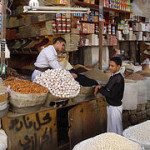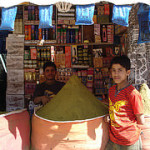The overall goal of IFPRI’s Country Strategy Support Program (CSSP) is to promote greater progress toward sustainable and pro-poor growth in developing countries by improving the design and implementation of development strategies. One of these successful efforts is the Ethiopia Strategy Support Program (ESSP), launched in 2004 with support from DFID and other donors. ESSP >> Read more
European Commission
The European Commission (EC) has been committed to ensure food and nutrition security, resilience to food crises, and agricultural development. Since 2006, the EC has committed €1 billion every year to strengthen and support global food security and sustainable agriculture. Over the years, the EC’s strong support to IFPRI provided the necessary foundation for cutting-edge research in areas such as climate change; biofuels; and the nexus of agriculture, nutrition, and health. In addition, it has helped IFPRI team up with strategic European partners in civil society, higher education, and public sector areas, with a focus on making food security research accessible through the development of global public goods, capacity-building networks, and technological platforms.
Highlights of IFPRI’s collaboration with the EC can be found in this brochure.
HarvestPlus: Reducing micronutrient malnutrition
Since 2004, alongside 70 partner organizations in more than 40 countries, HarvestPlus, which is supported by several transformational donors including the United Kingdom’s Department for International Development (DFID), has sought to reduce micronutrient malnutrition through biofortification. This means conventionally breeding staple food crops with higher levels of key micronutrients—namely, iron, vitamin A, and zinc—identified by >> Read more
Ensuring Yemen’s Food Security
In response to the 2007–2008 global food crisis, the Government of Yemen asked IFPRI to develop a National Food Security Strategy (NFSS). IFPRI, building on its previous work on food security in Yemen, provided technical support for the development of the strategy in close collaboration with the multi-ministerial Yemen Food Security Committee and with the support of GIZ, the European Union, and the World Bank. In addition, with support from GIZ’s "One World, No Hunger" Initiative, IFPRI continues to provide evidence-based solutions for tackling hunger in times of war through technical assistance, research and analysis, capacity building, and helping coordinate high-level policy workshops.
Open-Access Data: A Key to Sound Agricultural Policies and Investments
On September 15-16, 2016, the Global Open Data for Agriculture & Nutrition (GODAN) Summit will be held in New York. At the summit, IFPRI will be co-hosting a side-event called Precision Agriculture. IFPRI has been at the forefront of providing open-access data to improve policies.
Formulating Scenarios for Reconstruction and Development in Yemen
IFPRI assessed in 2012 the economic impacts of the socioeconomic changes and scenarios for reconstruction and development in Yemen
Securing Cereal Availability in Ethiopia
IFPRI’s research in Ethiopia dispelled the commonly believed causes of cereal price hikes: cross-border trade, increased demand for consumption, diversification into high-value crops, and speculative hoarding. In 2006, Ethiopian cereal prices were rising sharply and threatened food security, especially for net cereal purchasers. To develop research-based evidence to inform policy responses to the price spikes, IFPRI conducted a set of studies that examined agricultural production, markets, and prices within the country.




